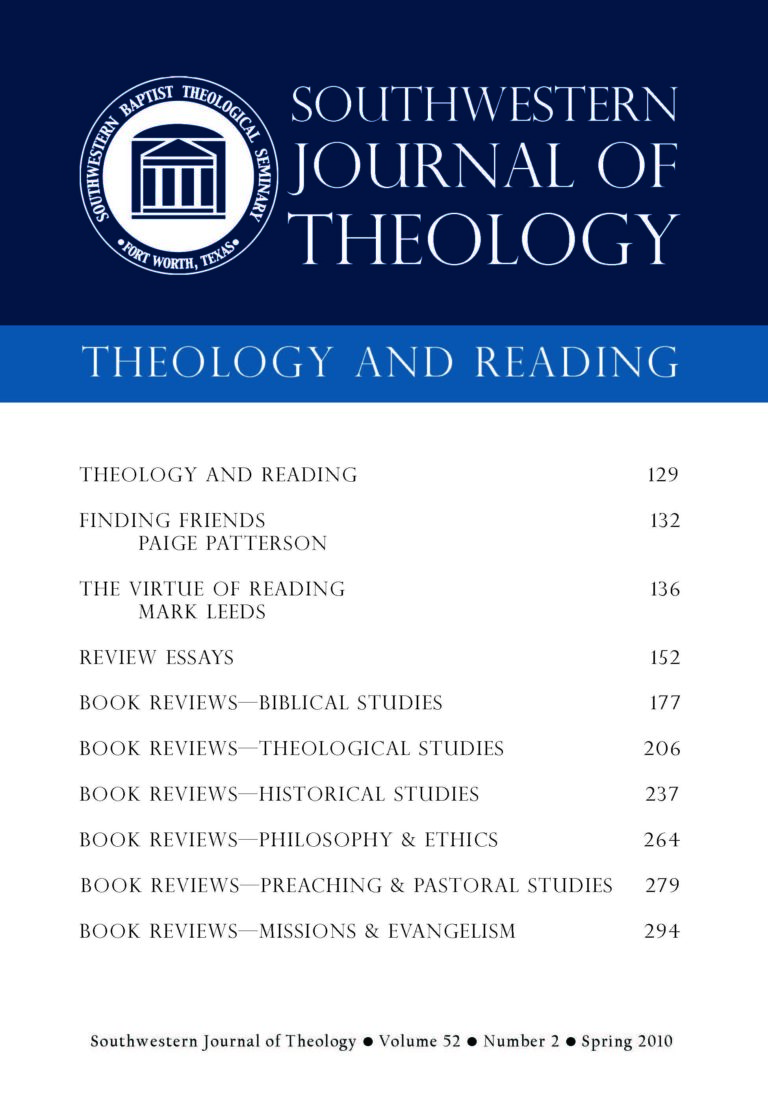
Theology and Reading
Southwestern Journal of Theology
Volume 52, No. 2 – Spring 2010
Managing Editor: Malcolm B. Yarnell III
By John R. Muether. Phillipsburg, New Jersey: P&R Publishing, 2008. 288 pages. Hardcover. $24.99.
Cornelius Van Til: Reformed Apologist and Churchman helps to clarify the life of Van Til, if not his obtuse transcendental methodology. Author John R. Muether has written a refreshingly straightforward and sympathetic biography. Each chapter unfolds chronologically. Muether avoids detailed analysis of his thought and idle speculation into his life and relationships. He provides an accurate and intimate window into the institutions, relationships, and controversies that define Van Til’s life.
As the title suggests, Van Til was a man thoroughly committed to Reformed theology. This commitment is evident through his involvement at Calvin College, Princeton, and Westminster Theological Seminary as well as in the Christian Reformed Church and the Orthodox Presbyterian Church. Reformed theology led Van Til to tirelessly promote Christian education and catechism training. It led him to oppose evangelicalism, ecumenism, and the Billy Graham style of evangelism that he thought softened the message of the cross. Muether quotes Van Til regarding his Reformed faith, “It is not the five-points [of Calvinism]. It is rather the measure of consistency with which it applies all the doctrines of Christianity.” (234) Van Til spent his life pursuing an apologetic and theological approach that was methodologically consistent with his reformed faith, and most of his controversies were over the degradation of reformed thought.
Muether shows Van Til surrounded by heroes including J. Gresham Machen, Geerhardus Voss, Herman Bavinck, B.B. Warfield, and Abraham Kuyper. Machen brought him to Westminster, kept him there (at times by persuasion), and was an unwavering ally until his untimely death. During his time at Westminster, Van Til was engaged in almost constant and substantive theological disputes with such men as Henry Dooyeweed, William Henry Jellema, and most notably, Karl Barth. The book masterfully explores his tenuous relationships with former students (like E.J. Carnell) and evangelical leaders, such as Francis Schaeffer, whom he considered to be in the Aquinas-Butler tradition despite all his talk of presuppositions.
Among his many debates, the book focuses on Van Til’s opposition to Barth. At a time when most theologians were imbibing neo-orthodoxy, Van Til argued that it was modernism repackaged, resting upon Kantian presuppositions. He decried Barthian influence on the Christian Reformed Church and sought to expose Barth as an anti-reformed universalist. Van Til avoided cultural commentary, but spoke out against Barth’s support for evolution as undermining the doctrine of creation, which is foundational to Reformed thought. Muether provides fascinating insight into Van Til’s attempts to meet Barth and their brief personal meeting in which Barth is claimed to have said to Van Til, “You said some bad things about me, but I forgive you. I forgive you.” Muether’s Van Til is both ready to battle and ready to make peace, as he would later say that he hoped to talk and laugh (with Barth) in heaven (191). The irony of Van Til’s costly opposition to Barth is that he was often accused of being Barthian.
Perhaps one important contribution this book makes to a Southern Baptist reader is to show a man and a movement promoting denominational heritage that, in ways, parallels the current Baptist Identity movement. Van Til models a balanced commitment to his local church, his denomination, and the universal church. His uneasy relationship with evangelicalism, commitment to the Bible, wariness of ecumenicalism, and overwhelming desire to pursue a biblically consistent theology will be familiar and appreciated.
For all its strengths, this book assumes too much familiarity with Van Til’s writing. It does little but mention the titles of his books and hardly attempts to trace any development in his thought. The first chapter tires the reader with descriptions of Afscheiding and Doleante, which could have been clearer. Moreover, there is only passing reference to Van Til’s legacy. Overall, this is a book well worth reading.





